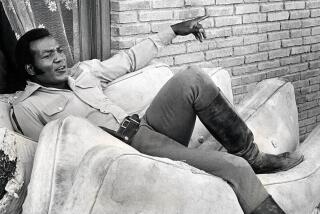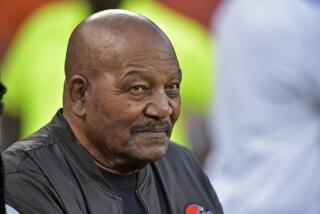James Brown’s legacy stays on the scene with ‘Get on Up’
It took producer Brian Grazer more than a dozen years — and an assist from Mick Jagger — to finally get on the good foot and make a biopic out of the turbulent, triumphant life of the Hardest Working Man in Show Business, music legend James Brown.
Arriving in theaters on Aug. 1, “Get on Up,” starring Chadwick Boseman (“42”) and directed by Tate Taylor (“The Help”), sees Brown’s roller-coaster tale (poverty, abandonment, soaring fame, musical innovation, a stint in prison) as emblematic of nothing less than the American dream, a story of self-reliance, aspiration and a man who had ants in his pants and the need to dance.
Grazer met with Brown several times to discuss the project but lost the rights after the singer died in 2006. After Jagger associate Peter Afterman wound up with the licensing rights to Brown’s music, Jagger called Grazer, proposing an alliance. “We learned a lot from each other,” Grazer says.
PHOTOS: Summer movie sneaks 2014
“Get on Up” sports at least a dozen of Brown’s most famous songs, including these five, which Grazer lists as his favorites:
“Try Me” (1958): Brown’s first No. 1 R&B hit has the singer delicately pleading for a chance at love. “Some of his songs are him just reaching out,” Grazer says. “You imagine this kid being beaten and, all of a sudden, he’s singing a song called ‘Try Me,’ and it’s powerful.”
“It’s a Man’s Man’s Man’s World” (1966): “Here’s another passionate ballad,” Grazer says, “one that, because of its title, gets pegged as chauvinism, forgetting that the world ‘wouldn’t mean nothing without a woman or a girl.’ That guy’s heart was broken constantly. He started from a place of complete abandonment and loneliness. As much as he loved a woman, it was scary to him and the way he reacted to that fear wasn’t always acceptable.”
FULL COVERAGE: Trailers, interviews and more on summer releases
“Cold Sweat” (1967): “We almost called the movie ‘Cold Sweat,’” Grazer says. “I liked it a lot, but everybody felt ‘Get on Up’ is more lively. But I thought ‘Cold Sweat’ was super-sexy and cool. The song’s so funky. You could be anywhere on the planet, late at night with a drink in your hand, and you might not understand the words, but you’re dancing when that song plays. His beats are the best.”
“Say It Loud (I’m Black and I’m Proud)” (1968): “He embraced his blackness as a truth and a power and was unashamed,” Grazer says. “And though he wasn’t militant politically, you really could say he was a world leader. This guy ends up in the White House. This guy ends up stopping a riot. This guy ends up all over the world, in Zaire, in Vietnam. And the statement he makes in this song is piercing.”
“Make It Funky” (1971): The song begins with Brown’s right-hand man, Bobby Byrd, famously asking, “What you gon’ play now?” and Brown answering, “Bobby, I don’t know. But whats’in’ever I play, it’s got to be funky.” “I’m sure it has deeper meaning to everyone studying Rolling Stone, but, for me, it’s just fun,” Grazer says. “I remember being in Jamaica with a bunch of friends at [hotel resort] GoldenEye, and that song just lit it up. He has so many songs that will light up any environment.”
More to Read
Only good movies
Get the Indie Focus newsletter, Mark Olsen's weekly guide to the world of cinema.
You may occasionally receive promotional content from the Los Angeles Times.











